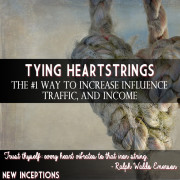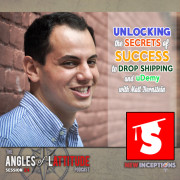AoL 026: Crushing Graphic Design like a GirlBoss with Sharlotte Bouniol
Many entrepreneurs start out as freelancers. They might call themselves consultants, but they’re really freelancers.
The difference, we learned in session 17 with Frank Forte, was that consultants are contracted for a much longer time. Maybe a year plus. Whereas a freelancer works per the project.
Either way, your services are for sale, and you live and die by each individual project.
Needless to say, you better have a natural gift or passion for what you’re going to be helping with. Otherwise you’re going to grow tired of the hustle to do jobs you don’t like doing really quick.
For me, the time that I spent at AMS you could have considered me a consultant. The IRS labeled me a contractor, but I definitely helped build the business… and continue to do so in different ways. Just today I was asked to take a look at something on the back end of the website and see if I could do something about it!
If you’re a freelancer, I’m sure you understand that feeling.
Today’s guest is someone that has a huge passion in what she does. In her past life, she’s been in various marketing positions including a Chief Marketing Officer. Eventually, though, she realized she liked helping Beach Body coaches with their branding. Word got out about her work, enough so that eventually she left the executive position to pursue her interest in branding and marketing.
In this session’s chat with Sharlotte Bouniol, we talk about a number of things including: how she became an intern for the Nielsen company, how she got a job at the #1 State Farm Agency in the US, why she started GirlBoss Graphix, and what inspires her creatively.
If you’re serious about becoming a freelancer, I think you’ll get a lot of inspiration from this chat. In reality it’s all about leveraging who you know so you can get referrals to do more work. Start in a niche, like Sharlotte, then work your way out!
SPECIFICALLY, YOU’LL FIND OUT MORE ABOUT:
- How Sharlotte got into marketing.
- How she became an intern for the Nielsen Company.
- Why she sees the world differently after the experience there.
- How she got a job at the #1 State Farm Agency in the US.
- The difference between niche marketing and niche product design.
- Why she finally started GirlBoss Graphix.
- How she actually gets paid for the work she does.
- How she was able to say goodbye to her last job and boss.
- Why she chose to build an online business vs being a “brick and mortar” agency.
- What inspires her creativity.
- Why she believes that personal development is important.
- Where her passion for helping special needs kids came from.
- …and MUCH more.
Right click here and save-as to download this episode to your computer.
ITEMS and PEOPLE MENTIONED IN THIS EPISODE:
- #GIRLBOSS by Sophia Amoruso (Amazon Link)
- Sharlotte’s Husband: Cyril Bouniol on Facebook
- Chalene Johnson (Listen to her interview with Pat Flynn!)
- GirlBoss Graphix
- GirlBoss Graphix on Social Media (Facebook, Instagram)
- Laila’s YouTube Channel
- Fizzle – Don’t waste money on big name courses. Save BIG with Fizzle! Click here to get your first 2 weeks free!
SHOW NOTE EXTRAS:
How to be a Freelance Artist (Dos and Dont’s)
In the video, Jazza talks about some of the hard learned lessons he’s had over the years
What Successful Freelancers Wish They’d Known from the the Start
(Just because it’s from the UK doesn’t mean it doesn’t apply EVERYWHERE!)
Is web design more your thing? Here’s John Morris on finding your first client on Upwork, Elance, and oDesk.
Thanks for Listening!
Thanks so much for joining us again this week. Have some feedback you’d like to share? Leave a note in the comment section below!
If you enjoyed this episode, please share it using the social media buttons you see at the top of the post.
Also, please leave an honest review for The AoL Podcast on iTunes! Ratings and reviews are extremely helpful and greatly appreciated! They do matter in the rankings of the show, and we read each and every one of them.
If you have any questions feel free to email them over via the email mentioned in the show or by our contact form.
And finally, don’t forget to subscribe to the show on iTunes, Stitcher, and/or Podbean. It’s absolutely free to do so.
A huge thank-you to you guys for joining us!
Cheers!









